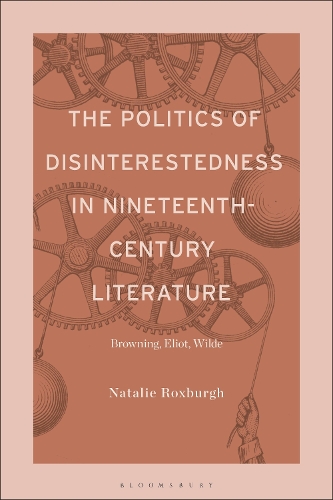
The Politics of Disinterestedness in Nineteenth-Century Literature: Browning, Eliot, Wilde
(Hardback)
Publishing Details
The Politics of Disinterestedness in Nineteenth-Century Literature: Browning, Eliot, Wilde
By (Author) Dr. Natalie Roxburgh
Bloomsbury Publishing USA
Bloomsbury Publishing USA
1st May 2025
United States
Classifications
Professional and Scholarly
Non Fiction
Literary studies: fiction, novelists and prose writers
Political economy
Philosophy: aesthetics
820.9353
Physical Properties
Hardback
192
Width 158mm, Height 232mm, Spine 18mm
420g
Description
Shows how to read disinterestedness alongside other important cultural changes particular to 19th-century Britain. The Politics of Disinterestedness in Nineteenth-Century Literature historicizes the concept of disinterestedness by examining discourses on political economy during and before the 19th century. It argues that certain literary texts developed to respond to the way all interests are transformed into economic interests in this period. It also shows that this has implications for aesthetics and questions of aesthetic autonomy, in which discourses on disinterestedness are tied up. Through a New Formal approach, Natalie Roxburgh provides fresh readings of texts by Robert Browning, George Eliot, and Oscar Wilde, whose respective oeuvres demonstrate an attention to the formal affordances of literary disinterestedness that compete with and critically assess other versions. Browning develops dramatic monologue so that the reader is enticed to re-read his poems; Eliot cultivates the problematic character who must struggle with her desire within a larger play of interests in a way that evolves the realist Condition of England novel; and Wilde experiments with the blending of genres in his critical essays by rendering them as dramatic dialogues that serve as contemplative mechanisms for playing with a multiplicity of interests, which he explores in terms of influence. Reading these canonical authors through the politics of disinterestedness sheds new light on literary value and, in particular, the formal techniques seen as important by the end of the 19th century, just as liberal democracy emerged in Britain.
Author Bio
Natalie Roxburgh is Senior Lecturer of English Literary and Cultural Studies at the University of Hamburg, Germany. She is author of Representing Public Credit: Credible Commitment, Fiction, and the Rise of the Financial Subject (2016) and co-editor of Psychopharmacology in British Literature and Culture (2020; with Jennifer S. Henke).
